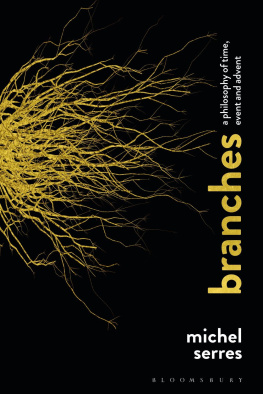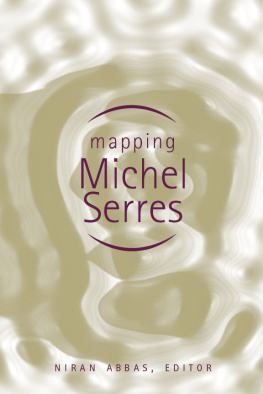Michel Serres - Branches : A Philosophy of Time, Event and Advent
Here you can read online Michel Serres - Branches : A Philosophy of Time, Event and Advent full text of the book (entire story) in english for free. Download pdf and epub, get meaning, cover and reviews about this ebook. publisher: Bloomsbury Publishing, genre: Romance novel. Description of the work, (preface) as well as reviews are available. Best literature library LitArk.com created for fans of good reading and offers a wide selection of genres:
Romance novel
Science fiction
Adventure
Detective
Science
History
Home and family
Prose
Art
Politics
Computer
Non-fiction
Religion
Business
Children
Humor
Choose a favorite category and find really read worthwhile books. Enjoy immersion in the world of imagination, feel the emotions of the characters or learn something new for yourself, make an fascinating discovery.
- Book:Branches : A Philosophy of Time, Event and Advent
- Author:
- Publisher:Bloomsbury Publishing
- Genre:
- Rating:4 / 5
- Favourites:Add to favourites
- Your mark:
- 80
- 1
- 2
- 3
- 4
- 5
Branches : A Philosophy of Time, Event and Advent: summary, description and annotation
We offer to read an annotation, description, summary or preface (depends on what the author of the book "Branches : A Philosophy of Time, Event and Advent" wrote himself). If you haven't found the necessary information about the book — write in the comments, we will try to find it.
Branches : A Philosophy of Time, Event and Advent — read online for free the complete book (whole text) full work
Below is the text of the book, divided by pages. System saving the place of the last page read, allows you to conveniently read the book "Branches : A Philosophy of Time, Event and Advent" online for free, without having to search again every time where you left off. Put a bookmark, and you can go to the page where you finished reading at any time.
Font size:
Interval:
Bookmark:

Branches
Also Available from Bloomsbury
Hominescence , Michel Serres
The Incandescent , Michel Serres
Statues , Michel Serres
Rome , Michel Serres
Geometry , Michel Serres
The Five Senses , Michel Serres
Times of Crisis , Michel Serres
To those who did me the honour of attending my courses
Branches
A Philosophy of Time, Event and Advent
Michel Serres
Translated by Randolph Burks


Contents

Todays world is screaming in pain because it is beginning its childbirth labour. At serious risk, we have to invent new relations between humans and the totality of what conditions life: the inert planet, the climate, living species, visible things and invisible things, sciences and technologies, the global community, morality and politics, education and health We are leaving our world for other worlds, possible ones, and will have to abandon a hundred passions, ideas, customs and norms brought about by our narrow historical duration. We are entering into an evolutionary branch.
In previous ages, no knowledge had ever had to conceive or lead projects that were as vital: reinventing the universality of the individual, reconfiguring his habitat, weaving new relations. From having to rethink everything, philosophy changes span and sees its responsibility grow. Either a new human, a citizen of the world, will appear, or humanity will totter. We have to bring about peace between ourselves to safeguard the world and peace with the world in order to save ourselves.
Anti-event protection system
Even though Venice, flourishing, was teeming with masts and merchandise, the Lagoons shipowners and charterers feared bankruptcy. Why? Because, along with the rising numbers and greater distances, a thousand risks and wagers increased with the growth of their shipping exchanges; power on the open sea brought with it as many unforeseen events. Carefully laden, one ship sank, while another one, light, arrived in port safe and sound; the too dry season lost its harvest; in Constantinople, one correspondent underpaid, while the one in Marseilles died To sell a coat in Padua, herds of sheep subject to epizootics had to be bred in the Balearic Islands; after shearing, the wool had to be carded in Narbonne; shipped by sea in calm or bad weather; stored in Genoa in rat-infested warehouses; woven in Rome; the garment had to be made in Turin, shipped again via roads crisscrossed with thieves How can one not get lost in such an arborescent network of accidents and obstacles, interrupted many times over, knotted together elsewhere and differently for wheat, wine or spices? How can one master the flows of money circulating here and there, credits, long- and short-term debits, loans, dividends, exchanges between florins, ducats and other necessities, customs duties, octrois, taxes of every type, due in a space cut up by a hundred feudal systems to say nothing of corrupt financiers, swindlers or other pirates, whose life even Cervantes shared?
Mediterranean commerce never would have unfurled, around the Renaissance, its wealthy profusion, crowned with immortal works of art; Venice never would have experienced such a splendour and this success if they hadnt concentrated, applied, even given rise to a thousand and one expertises as well as precise technologies and techniques: from the time-counter to the division of space into a network, from the fixing of units of every type to accounting , measures intended to be prepared for any event.
Balance and balance sheet
The first books of this accounting described the whole of these operations in minute detail, line items and dates, transits and routes, costs and expenses, losses and profits, bills and projects. Their calculation aims at a general balance sheet that would put in order the firm of the person who maintains it and keeps it balanced, and would predict his future and prosperity. Just as, in his shop or the marketplace, the local merchant would hold a balance in his hand to weigh flour or salt and get a fair and accurate price and profit from this, so the shipowner and the banker, in their establishments, in which a hundred messenger boys and sailors hurried about, invented, so as to be able to launch operations to the four corners of the so-called inhabited world, invented, as I was saying, this accounting balance sheet, an abstract and generalized balance, as it were.
A refined instrument applied to a complex and fluctuating network, the balance sheet presupposed the gathering and support of other metric tools, already invented: balances, of course, to assess weights when preparing to cast off or unloading at the wharf, but also numbers and units (not only for these weights but also for lengths and volumes) suitable for contributing, through the series they form, to rules and accounts; clocks to mark time; a calendar thats precise and, if possible, standardized in order to bring the correspondents into agreement regarding dates, settlement dates and repayments; currencies whose value everyone agrees on, therefore a kind of Stock Market in which exchange rates would be debated; a common language, the lingua franca spoken by sailors and port travellers during those times; an arithmetic and processes of calculation, addition, division ; natural logarithms appeared; processes for manufacturing paper, the cutting of books and page margins, the separation of words, the arrangement of chapters and paragraphs similar to those first musical scores equipped with notes named according to the first words of a hymn: ut, re, mi, fa rules for calculating, without an astronomical model, without compasses or portulans, without a chart presupposing an exact network of space? These machines, these references contributed to a true mastery via this generalized metric.
This standardization of weights and measures, signs and acts made globalized exchanges possible among what was still called the inhabited world. In the space of this time, no economy of this size could have been built or could have functioned without these numbers, these accounts, not only without the measurements they permitted or presupposed, but above all without this generalized metrology. The economy resulted from this metrology at least as much as it conditioned it. Its newness lastly presupposed or accompanied the emergence of modern science at the same time and in the same places: Italy and the Flemish merchants, the respective countries of Gerolamo Cardano and Simon Stevin. Not, I repeat, that I believe that the economy determined the scientific discoveries, but the bringing together of a set of technologies and techniques of the same type, of a type Im trying to name, conditioned the complex business exchanges around the Mediterranean, at the time of the Renaissance, and the emergence of the science we inherited.
Format: Homogeneous units, series, repetitions
I call this type format: accounting or countability formats exchanges, the way the computer , today, formats our information I take accounting [ comptabilit ] as my example because the word precedes the word that designates, in Anglicized Latin, our machines; by grouping the countable [ comptable ] and the measurable, both of them carry out a thousand formattings, presupposing elements, series, repetitions, homogeneity, measurements and agreements concerned with domains we instinctively think have no relation.
Font size:
Interval:
Bookmark:
Similar books «Branches : A Philosophy of Time, Event and Advent»
Look at similar books to Branches : A Philosophy of Time, Event and Advent. We have selected literature similar in name and meaning in the hope of providing readers with more options to find new, interesting, not yet read works.
Discussion, reviews of the book Branches : A Philosophy of Time, Event and Advent and just readers' own opinions. Leave your comments, write what you think about the work, its meaning or the main characters. Specify what exactly you liked and what you didn't like, and why you think so.










